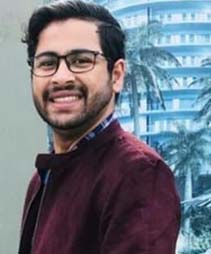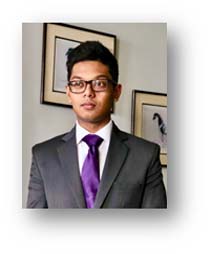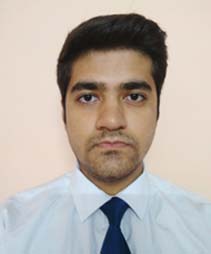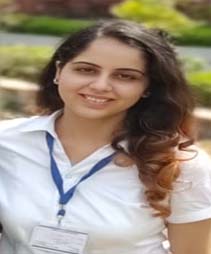
It was prestigious 4 year long journey at Amity University, Noida. I was awarded scholarship throughout the program.From the beginning of my degree i was enthusiastic about Electronics and wanted to learn about
how Chips are Designed and work. From Meeting visionary to extraordinary professor,scholars ,researches and experiencing advance labs enabled me to explore my interest.
Jai Sehgal, B.Tech - ECE (2016-2020)
placed in ZTE telecom India LTD

âAmity provided me a platform in which one is ought to vanquish their goals and fulfil whatever they desire to do with their life. I started pursuing my Bachelors of Technology degree in Electronics and
Communication in 2016, the time when I was anxious and curious to know what Amity has in store for me.
Agneev Das, B Tech ECE (2016-20), ASET
Placed in EY (as Analyst in Business Advisory Services)

My continued success is directly attributed to the professional and dedication of Amity University. Amity is a place where individuals come in different skill sets, aspirations and attitudes. In this college I
have learnt to think independently, be creative and push myself out of comfort zone. This is a college that adds significant value to each student and helps individuals reach his or her highest potential.This
institution gave me a chance to sit for one of the most esteemed organizations, Google.
Rishi Deb, B.Tech - ECE (2016-2020)
Placed in Google

Amity University works for scholastic and co-scholastic development of their students. This institute extends beyond the classrooms and provides hands-on exposure to the students .Working towards excellence not
only includes students exposure to various fields but also professional attitude of our lecturer/professors which help in building up our technical skills. Scholarships offered by Amity University not only builds
up and boosts up our confidence but also enhances the willingness to do well in life.
Ridhima Puri, B.Tech ECE,2016-2020
Placed in : ZTE Telcom India Pvt Ltd

One of the most important things I learned during my time in Amity was that sometimes it's important to fail at something to succeed at it...later. I was never the most brilliant student, never amongst the
highest scoring, I was someone who spent more time on stage than in the classroom, but Amity had this culture that made me feel that, whoever I was, they believed in me and wanted me to succeed.
Shrenik Jain
B.Tech ECE (2004-2008)
Working with Siemens, USA

My years at Amity are truly memorable. I was taught by some learned and highly experienced professors and feel that my department still welcomes me as an alumnus. ASET-ECE is a perfect amalgamation of experience
and youth under a capable leadership to provide students an all round development. The department motivates research and facilitated me with the opportunity to co-author several technical papers in Springer,
Taylor & Francis and IEEE.
Shaunak Ganguly
B.Tech - ECE (2010-2014)
Intern at Robert Bosch Campus, Renningen, Germany

I joined Amity in 2006. As with anyone about to start a new chapter in life, I was eager thinking what lay ahead. Slowly but surely I came to know that I had unwittingly come to one of the most diverse and
energetic campuses of India. I had joined ASET-ECE and during the first year itself made some friends for life. The training I received during the four years propelled me forward to a career comprised so far of
exciting experiences at space exploration companies in the US and at NASA. My word of advice to students is: "Never quit on your dreams, no matter how lucrative the other path seems".
Abhijeet Kumar,
B.Tech - ECE (2006-2010)
Flight Controls Engineer, Rockwell Collins,USA

In the span of 4 years, Amity inculcated the spirit of motivation in me to rise above and achieve success in life. It has taught me to sail through hardships and withstand difficulties. "A firm belief in God will
always keep you moving" is a lesson learnt by me from our esteemed founder Dr. Ashok K. Chauhan. Engineering was a wonderful experience for me.I believe Amity will always welcome me as an alumnus and continue to
prosper.
Ilika Sharma
B.Tech - ECE(2011-2015)
Core Engineer, Ericsson India Pvt. Ltd.

I am proud to be a part of Amity Family as this prestigious Institution has given me the right platform to excel and come out with flying colors. Amity University acted as a launchpad to create an opportunity for
me to complete my Masters' project in Nanyang Technology University, Singapore. I have maintained the good reputation given to me of being a Topper till date. I hope to learn and excel more and will always be
grateful and thankful to Amity for everything I have and will achieve.
Udit Narula
M.Tech - VLSI (2013-2015)
Pursuing Ph.D at Chang Gung University, Taiwan

I am thankful to Amity University, Noida for giving the platform to continue my research work during my M. Tech. I have also completed my summer internship in IIT, Delhi as a research fellow and completed my M.
Tech dissertation in Indian Statistical Institute, Kolkata. My M. Tech dissertation was filed as patent and won the IEEE Innovation Award all over India for my patent from IEEE, Kolkata Section. I have also got
IEEE nomination for Engineering Excellence Award from IEEE and applied for it.
Dhrubha Ghosh
M.Tech - VLSI (2013-2015)
She has got Phd admission in Stanford University and will join in July 2016.

It was a great experience studying at Amity University, a memory to cherish for a lifetime. My experience at Amity University was full of learning and grooming. Being a global University, I got an opportunity to
travel abroad, meet different kind of people from around the world and learnt many things from them. I am thankful to all the faculty and ECE department for me in enhancing our academic and interpersonal skills.
I am also thankful to the placement department for getting me placed in a Dream Company. “AMITY IS THE PLACE WHERE TALENT MEETS OPPORTUNITY”.
Pranay Malik
B.Tech ECE (2017-2021)
placed in Dell Technologies

Amity University has shaped me and students like me in every aspect, from my education and qualification to the person that I am today. The faculties here have always encouraged the students to move out of their
comfort zones and explore options unknown to the research. The International conferences held annually, provide a lot of exposure to students. The ECE department not only gave their best to provide us with a
quality of education but also made sure that we got enough experience of the professional world. We were provided many opportunities in terms of internships and training. The university is very well known for its
placement ratio. And I as a student have experienced it first-hand. Despite it being a pandemic, Amity has managed to place all the students.
Dheerika Pandey
B.Tech ECE (2017-2021)
System Engineer, Tata Consultancy Services

Amity University gives the right stage and ambience to showcase your abilities and talents. It helps you to discover the horizons of your life. Amity provides with a strong framework of faculty and mentors
because of whom, I am in this successful position. Getting placed in Cisco was only possible due to the close association of my hard work and ECE Dept. support. Success is a journey through which every student
goes through and it is the role of educational institution to take us to our final destination. Amity University has played an immense role in my success. Proud to be an Amitian for Life!
Pranjul Kumar
B.Tech ECE (2017-2021)
placed in Cisco































